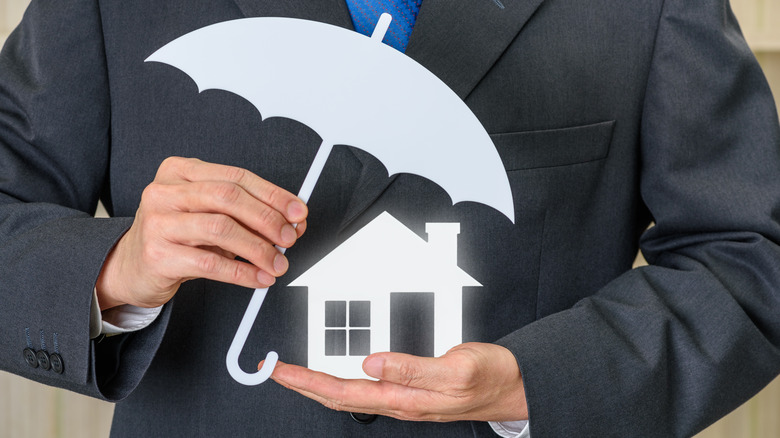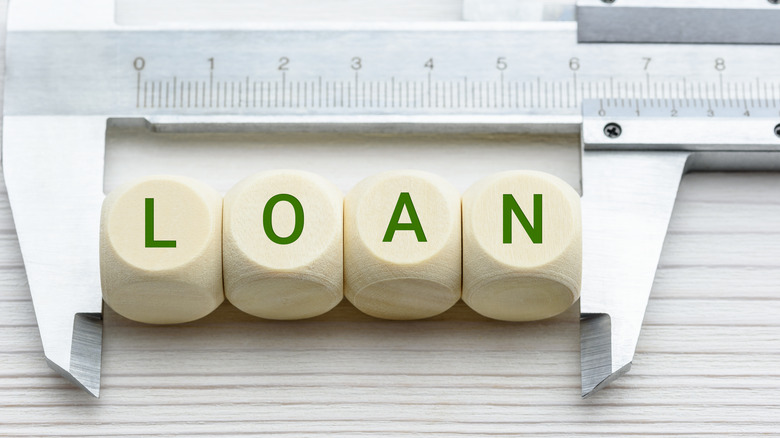Everything You Need To Know About Reverse Mortgages
A reverse mortgage is a financial product that older homeowners can take advantage of. The main criteria for taking out a reverse mortgage are that you must be at least 62 years old and own at least 50% of the equity in the home, explains Investopedia. Reverse mortgages provide funds to homeowners in exchange for deferred repayments that won't take effect until the homeowner leaves the property. Supplementing a retirement income such as Social Security checks, pension, or personal retirement savings with capital equity from your home can make for a much more fulfilling life in retirement, but this financial option isn't ideal for everyone.
A reverse mortgage is a great idea for a homeowner with significant equity in their property and who intend to remain in their home for many years to come. This provides the best cash consideration in taking out the loan by using the home as collateral. Conversely, homeowners who are in poor health or those considering downsizing their property aren't great candidates for a reverse mortgage product. If you are currently considering a reverse mortgage, there are several other factors that need to be taken into account.
Reverse mortgages don't require monthly payments
Unlike a credit card or a traditional mortgage, repayment of a reverse mortgage is only done once the owner either sells the home, moves out, or passes away. As a result, reverse mortgages can feel more like a retirement investment product than a loan. While this can be a positive aspect, it also means that you'll need to keep careful track of spending and utilization. Without a monthly payment to contend with, it can be incredibly easy to overspend rather than make use of the financial product as a budgeting tool.
Bankrate also notes that a reverse mortgage adds interest into the equation, just like a traditional borrowing arrangement. However, because you are drawing from an available pool of funds rather than utilizing the entirety of a loan balance upfront (as would be the case with a personal loan or traditional mortgage), the actual weight of any added interest is significantly reduced.
Reverse mortgages provide additional cash
One thing that many retirees face upon leaving the workplace is a sudden change in their incoming funds. At retirement age, many homeowners have typically finished paying off their traditional mortgage loan, and monthly food expenses and other living costs may be reduced. Yet, many people still face an uphill battle to make their finances work for them, especially if they are differing the withdrawal of Social Security benefits to gain a better monthly payout in the next few years, notes the U.S. Social Security Administration.
Reverse mortgages can provide a relatively cheap line of credit as a cash flow supplement. Typically, the equity in your home stays locked into the asset unless you choose to sell it or purchase a new, less expensive alternative. Thus translating some of the value into usable cash. However, with a reverse mortgage, you are able to borrow against the value of your property and not worry about repayments in the short term.
Reverse mortgages for home sellers
Reverse mortgages are not a good idea for homeowners who are likely to move in the near future, notes Investopedia. You will not be responsible to repay the loan for as long as you remain in the home — although you do have the option to make payments in the balance. In consideration of the upfront costs of a reverse mortgage, this financial product only makes sense for those who are planning to stay in their current residence.
Bankrate reports that other considerations can play a role in this decision as well. It's important to note that if you leave the home to move into a full-time medical care facility then you may also be required to repay the balance. Additionally, if an adult child comes to live with you, or you get married after taking out a reverse mortgage, it's important to understand that changes in your life can affect other family members' ability to remain in the home or maintain ownership of the property. Generally speaking, the best candidates for reverse mortgages are homeowners with a good amount of equity and those entering their retirement period in good health.
Reverse mortgages increase risk
Any instance of borrowing against collateral places the asset into an increased position of risk. While a reverse mortgage isn't the riskiest option out there, it still can create a burden on your overall financial wellbeing, and in turn, jeopardize your status as a homeowner. Investopedia reports a number of costs associated with a new reverse mortgage loan, including an origination fee of up to $6,000, and upfront mortgage insurance premiums that can be as much as 3% of the loan. This comes on top of an ongoing 0.5% premium each year, warns Bankrate.
In order to maintain a reverse mortgage, you must stay current with property taxes, homeowners' insurance, and other financial requirements of typical home ownership. In addition, your local tax authority has a claim on the home in the event of tax debt. Therefore, staying current with your financial obligations, as well as keeping up with essential home maintenance, is essential to remaining in good standing with the lender.
Do reverse mortgages affect inheritance?
Bankrate reports that homeowners have a few options regarding their heirs when utilizing a reverse mortgage. Heirs are able to settle the reverse mortgage in a number of ways: They can forfeit the title to the lender if the balance exceeds the property value, they can sell the property and keep the balance after paying off the debt, or they can refinance the property and keep the home.
Because a reverse mortgage is a non-recourse loan, the debt burden won't transfer to an estate or surviving heirs, explains Investopedia. Likewise, Bankrate also notes that reverse mortgages are FHA secured, meaning lenders are prohibited from acting in a predatory manner against heirs or spouses working to settle an estate after a borrower's death. Instead, if an heir chooses to forfeit the title to the bank, a lender can simply file a claim with the Federal Housing Administration for the unpaid balance.
Regular mortgages vs. reverse mortgages
First, let's look at what both types of loans have in common. Most people are under the impression that if you opt for a reverse mortgage, the bank owns your home, which isn't true. You own the house regardless of which mortgage you choose. Before either type of mortgage can be approved, the owner is assessed to ensure they can meet the obligations. Both types of loans still require owners to pay property taxes and maintain property insurance.
The main difference is in how you choose to repay it. With a reverse mortgage, the owner can make payments according to their own schedule, rather than the bank's schedule. This means the stress is reduced significantly, as borrowers repay the loan at their own pace. This is especially beneficial for seniors, who live on a fixed income and can use that money for something else. Interest accrues, however, so the balance increases. The loan only becomes due when owners cannot meet the terms or no longer live in the house. However, heirs cannot be charged more than the house is worth. Once the house is vacant and it's time to pay the outstanding balance, they can sell the house and square away the loan with the proceeds.
Types of reverse mortgages – Home Equity Conversion Mortgages (HECMs)
There are actually a few different types of reverse mortgages, but most are called HECMs, or home equity conversion mortgages. These loans are FHA-backed and available to seniors as a sort of advance on the equity in their homes. It has limits, but they're relatively high and based on the home's appraised value. This type of reverse mortgage is usually offered at low-interest rates, as well. Borrowers will be required to pay mortgage insurance costs on a HECM, but these costs can be rolled into the loan. However, it goes towards the limit available to borrow.
Since HECMs are backed by the FHA, they have certain requirements homeowners must meet. A HECM can only be issued by an FHA-sponsored bank that offers them. While the interest rates are low, the required origination fees, mortgage insurance, and maintenance fees can add up, and you can still lose your home under certain circumstances. You must be able to keep your property in good condition and use it as your primary residence. As previously mentioned, property taxes and insurance must be kept current. Lastly, you can't be away from the house for more than 12 consecutive months, even if it's because of an extended hospital stay, or the HECM becomes due immediately.
Proprietary (not FHA-backed) and single purpose reverse mortgages
The other two types of reverse mortgages are (non-FHA backed) proprietary and single-purpose reverse mortgages. A private lender offers a proprietary reverse mortgage to homeowners who want access to a higher amount of money. These are typically people with homes appraised for higher than the FHA limit allows them to borrow. According to Investopedia, in 2022, the limit was $970,800. Though this type of reverse mortgage is rare, it works similarly to HECMs regarding how the borrower can set it up. A line of credit is given up to the amount the home is appraised for, and then the homeowner has several choices for the method of disbursement. There aren't very many lenders who offer this type, however.
A single-purpose reverse mortgage is another type of assistance for senior homeowners to help cover specific costs. This type of loan is the least common of the three reverse mortgages and isn't available in many states. In states that do offer them, they will be found at certain government and nonprofit agencies. The single-purpose name is appropriate, because the lender agrees to disburse payments to senior homeowners from the equity they've built, but for a specific purpose that they approve of. Typically, this is relegated to things like home repairs or property taxes. If you can find a lender, they're less expensive than both of the other types of reverse mortgages.
Possible alternatives
Since reverse mortgages present a risk of losing your home and ultimately result in your heirs having to sell it to repay the loan, you may want to consider some alternatives. One of these would be to refinance the mortgage instead. Often people refinance to obtain a lower interest rate and monthly payments, which could ease the burden of being on a fixed income. Refinancing doesn't remove your house as an asset for your heirs, so it can be preferable to a reverse mortgage.
Another option is to obtain a home equity loan or line of credit, which would give you either a one-lump sum or a fixed amount to draw on as needed. Essentially you're borrowing against the equity you have built up in the home, but each has pros and cons. Currently, the interest on home equity loans is not tax deductible and is a fixed rate, but higher than for a line of credit. The HELOC (home equity line of credit) is set up with an approved credit limit available to you on an as-needed basis, and you're only required to pay interest on the money used at an adjustable rate.
Another alternative for struggling fixed-income homeowners would be to sell the house and purchase a smaller one. Or, perhaps selling the house to your children or heirs could be an option. In this scenario, it's possible to set up what's called a sale-leaseback agreement, allowing you to rent the house back with the proceeds. This also helps the heirs since they can take tax deductions and receive a rental income, giving them more cash flow. A private reverse mortgage might also be worth looking into with an estate planner.
The process of getting a reverse mortgage
We've discussed some of the requirements for taking out a reverse mortgage but not much about the process. The first step, of course, is the application process, which has five stages and takes 30-45 days to complete. Homeowners are advised to spend several months researching the best options available to them before even starting the application. Once they begin, the first step is reviewing all the terms and specific information in the application when it's filled out. At any point, the borrower can cancel the application before funds are disbursed.
The next stage involves attending specialized counseling for reverse mortgages and obtaining a HECM Counseling Certificate upon completion. HUD has a list of approved counseling agencies you must choose from. This step is mandatory but can usually be done before or after the application. Once these things have been done, the next step will be an appraisal specifically done by an FHA-approved appraiser.
Step four is the period of underwriting. The lender confirms that the applicant actually owns the house and has the title. Any issues will be dealt with at this time, and the property will be cleared for a closing date. Then in the final step, the homeowner and lender meet to set that date and sign papers before the notary. At this point, there's a three-day period called the right of rescission, during which the borrower can still change their mind without being penalized. When the three days are up, the lender issues the check.
Is it possible to refinance a reverse mortgage?
The possibility does exist to refinance a reverse mortgage. In fact, there are a few scenarios in which you might want to consider this option. One of them is if you want to add your spouse's name to the loan, and another is if the value of your home has increased. Or perhaps your financial situation has had significant changes, or you think you can get better terms. All of these are valid reasons to refinance your reverse mortgage. You can refinance either into another reverse mortgage or a traditional mortgage. To be eligible, you must have your existing reverse mortgage for at least 18 months.
If you want to switch to a traditional mortgage, you must have a credit score of at least 580. Additionally, lower interest rates could enable you to access more of the equity, resulting in more money being available to you. If you think a refinance might be advantageous, speak to a financial advisor to discuss the details first.
Take your time when shopping for a reverse mortgage
Getting a reverse mortgage is a big step, and although it can be a good option for some people trying to live on a fixed income, it's not an ideal situation and isn't for everyone. It's important to take plenty of time to research everything before committing to a reverse mortgage. Being able to access your home equity now can certainly be tempting, but in the end, unless you or your heirs have the money to pay it off, your home ceases to be an asset. They'll still be required to sell it after your death to pay off the reverse mortgage.
Be sure to shop around for the best rates and terms, and decide how you want to have the loan disbursed. There's a lot of information to know about reverse mortgages, and there are shady lenders, too. Watch for scams; unfortunately, scammers often prey on the elderly and the uninformed. If you have a financial advisor or professional you can speak to, that would be a wise decision. Remember, different lenders will offer different terms and rates, so it's important to compare. Fixed or variable rates are another point to consider, where fixed rates have the same interest rate for the duration of the loan, but variable rates fluctuate with the market. Education is the key to deciding whether a reverse mortgage is right for you or not.












